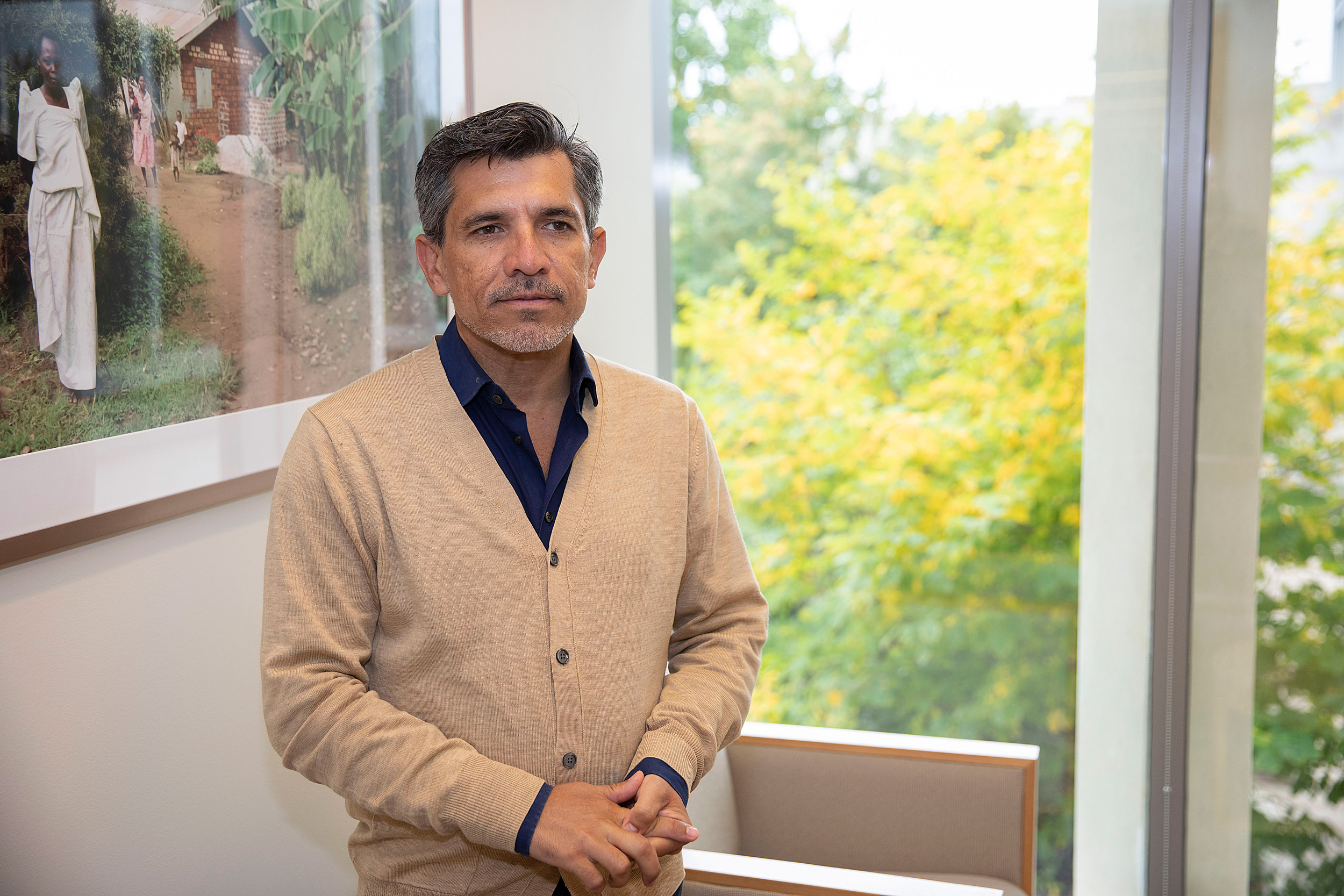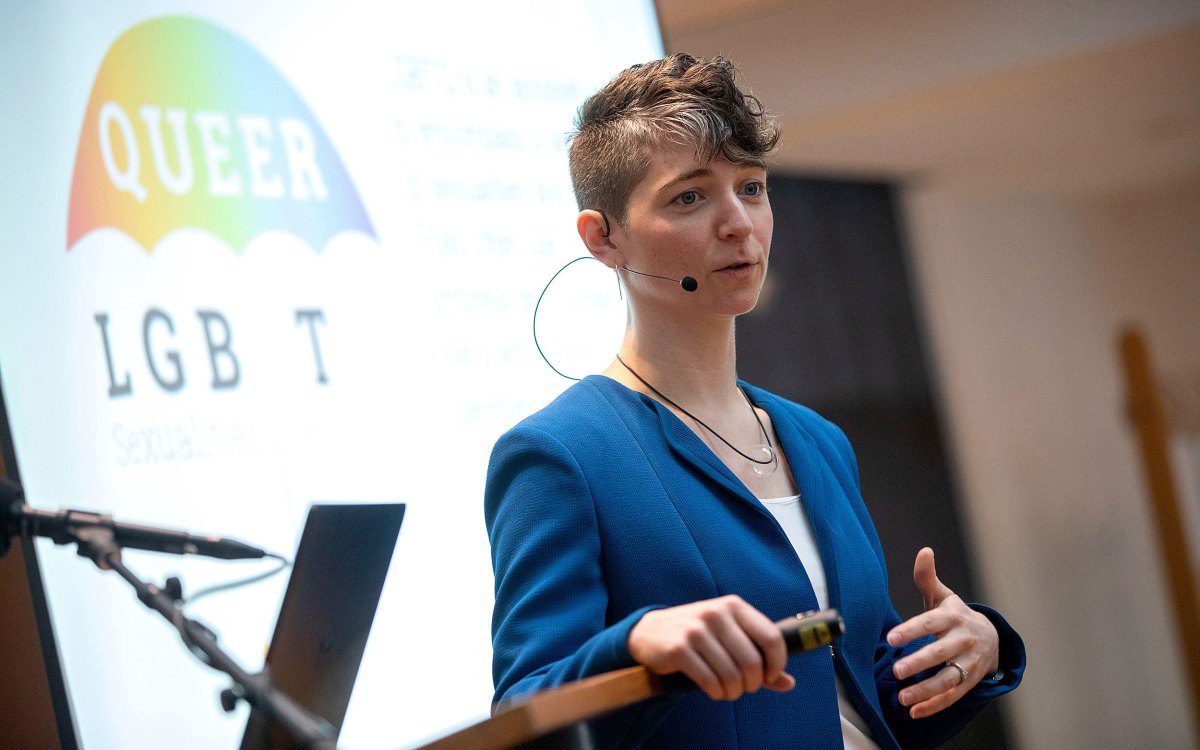
Victor Madrigal-Borloz, the U.N. independent expert on protection against violence and discrimination based on sexual orientation and gender identity, is in residence at Harvard Law School.
Kris Snibbe/Harvard Staff Photographer
A global look at LGBT violence and bias
U.N. independent expert’s report examines root causes and highlights danger spots and progress
Costa Rican magistrate Victor Madrigal-Borloz has served for the past 21 months as the U.N. independent expert on protection against violence and discrimination based on sexual orientation and gender identity. He will present his report on how laws and cultural norms adversely affect LGBT individuals to the U.N. General Assembly on Thursday. The Gazette interviewed Madrigal-Borloz, who is the Eleanor Roosevelt Senior Visiting Researcher with the Human Rights Program at Harvard Law School, to talk about his work and his hopes for the future.
Q&A
Victor Madrigal-Borloz
GAZETTE: Why did you decide to take on this role?
MADRIGAL-BORLOZ: I have been working in the field of human rights for over 20 years and I saw the possibility to bring about substantial change. The topic bears a lot of significance to me, as a gay man myself. I have been working on these issues for over a decade, first at the Inter-American Commission [on Human Rights] and now at the global level. I have seen many people suffer as a result of stigma and discrimination, and this was a once-in-a-lifetime opportunity to do something about it and put my skills at the service of a cause.
GAZETTE: What did your report find in terms of the root causes of violence and discrimination against LGBT people?
MADRIGAL-BORLOZ: There are primary and secondary root cases. First, there is the notion that societies are structured around certain power relations, which have been designed in relation to a person’s sex. Your role in society is determined by your genital configuration. That’s a very basic construction, and all forms of violence and discrimination come from a defense of those power relations. The other factors come from mechanisms that aim to protect those power relations, such as the idea that gay, lesbian, or trans people don’t exist, and the stigma around them, which is enabled through the message that gay, trans, bisexual, and lesbian people are sick or mentally ill. The other aspect is criminalization. Same-sex relations are still criminalized in 69 countries, which means that, as of today, over 2 billion people live in countries where being gay or lesbian is illegal. Another factor is demonization expressed in the notion that somehow LGBT lives are sinful, immoral; that gays or lesbians cannot be good citizens. The idea is that at the end of the day, there’s something immoral about our existence, and that’s what all of us need to fight against.
GAZETTE: Of your findings, which ones struck you the most?
MADRIGAL-BORLOZ: What disturbs me is that in 2019 there are countries that are considering bringing back the death penalty for same-sex relations. There was a discussion in Uganda about it, and early this year Brunei Darussalam enacted legislation allowing the stoning of gay men. That, to me, is shocking. What I also find surprising is that there are environments that are actually extremely progressive when it comes to gender identity, but can be very restrictive when it comes to sexual orientation and vice versa. In Pakistan, for example, there is an extremely forward legislation on the recognition of gender identity, but sexual orientation is very much criminalized. Sexual orientation has always been a more challenging notion for societies, which in general have used the notion of a traditional binary, hetero-parental family as the nucleus of society, and this has been recognized in public discourse and in the law. But what we also know is that homosexuals, lesbians, and bisexuals have existed and sought happiness all throughout history.
“Criminalization forces people to live underground, and often the situation of those whose existence is considered criminal is devastating.”
GAZETTE: What policies or practices have been the most successful in the protection of LGBT rights?
MADRIGAL-BORLOZ: Anti-discrimination legislation with the words sexual orientation and gender identity is very important because it allows for all actors in the system to understand that a red line has been drawn and that shouldn’t be crossed. This creates the belief that lesbian, gay, trans, bisexual, or gender-diverse people are entitled to protection. Other good practices are policies aiming at promoting integration of LGBT people in society and campaigns to change hearts and minds.
Let me give you an example. About a year ago, the Inter-American Court of Human Rights issued an advisory opinion, OC-24, which determined that Costa Rica and other countries in the continent must implement same-sex marriage, and it gave a time frame for that. Despite the fact that this created great polarization in Costa Rica, the Costa Rican state has now put together a campaign called “Yes, I do,” or in Spanish, “Si, Acepto,” which focuses on the parents of gay and lesbian children and their reasons why they support gay marriage and why their children are entitled to happiness.
Another good measure is access to justice, and this means that judges have to actively seek to implement the principle of nondiscrimination when it comes to LGBT rights. That’s what the Supreme Court of India, the Supreme Court in Botswana, and the High Court in Trinidad and Tobago did when they voted to decriminalize gay sex in their respective countries.
GAZETTE: How do you explain the dramatic advances in the protection of LGBT rights in regions such as Latin America, where same-sex marriage is now legal in five countries?
MADRIGAL-BORLOZ: It’s the work of civil society and human-rights defenders and advocates who have fought relentlessly for their rights. I began working on these issues over a decade ago, and at that time the trans movement in South America was strong. An extraordinary trans activist in Argentina, Lohana Berkins, used to say that trans women must expose the audacity of their bodies to the society that fails to understand the fragility of their lives. The average life expectancy of a trans woman in Latin America is 35 years, and that’s what Berkins was talking about. It was her voice and those of other great fighters in the LGBT movement that forced people to see their humanity, and ensured that Argentina, Uruguay, and other countries in the continent have the most advanced legislation on legal recognition of gender identity.
GAZETTE: Which countries are the worst and best performers in terms of LGTB rights?
MADRIGAL-BORLOZ: I have a lot of resistance to ranking countries, because things change very fast. Most of these rights are not necessarily enshrined or written in stone; there are forces in societies that are quite keen on seeing them taken back. We live in times in which rising populism uses certain categories of people, such as LGBT communities, as pawns for their political objectives. But I can say that the most problems arise in the countries where gay sex is criminalized, and they are roughly distributed along the Caribbean, sub-Saharan Africa, some regions of Asia, and the Middle East. It’s not a small part of the world. Criminalization forces people to live underground, and often the situation of those whose existence is considered criminal is devastating. The killing of trans women, for example, has been invisible from public records because they are classified as men. And the levels of violence against lesbian women and gay men all over the world is worrisome.
“Elderly LGBT people are suffering enormous health disparities, and after living their lives in inclusive environments, they are being forced to go back into the closet as they move to retirement communities that are not prepared to cater for their needs. They deserve happiness now.”
GAZETTE: Why have there been more gains in protection of sexual orientation than gender identity, and what does it say about the possibility of social change?
MADRIGAL-BORLOZ: There is a certain concentration of power and influence within gay and lesbian, or cisgender, urban populations. They have been able to represent their valid agendas in the political debate. On issues of concern for the gay and lesbian urban upper and middle class, there has been more progress than on those concerning trans women or trans men coming from the countryside. But those gains show that social change is possible within one generation. Those of us who were born in the ’60s have seen the world change from a majority of countries criminalizing and pathologizing LGBT identities to a majority of countries embracing the richness that comes from diversity.
Social change is possible when the prime minister of Luxembourg speaks at the General Assembly last week, and declares “I was never hoping to be the gay prime minister. I just happen to be the gay prime minister.” When political leaders take part in a pride parade, they are changing the views that people have about LGBT people. I’ve had the honor of marching alongside Justin Trudeau in Vancouver, and the first lady of Costa Rica in pride parades. That makes me hopeful, but also the fact that the new generations have changed their paradigm of thinking; they embrace the notion that their existence is not determined by rigid notions of gender. That is a great source of inspiration.
But I worry that for some, the change will not come fast enough. Elderly LGBT people are suffering enormous health disparities, and after living their lives in inclusive environments, they are being forced to go back into the closet as they move to retirement communities that are not prepared to cater for their needs. They deserve happiness now.
GAZETTE: What would you like to see happening before your tenure as the U.N. independent expert ends in 2020?
MADRIGAL-BORLOZ: My dream is to see a world free of criminalization of same-sex relations by 2030. Given the fact that international human rights law considers criminalization of same-sex relations a violation of human rights, I see no reason why states would actually get away with continuing this practice past 2030. That’s what I like to dream about.
This interview has been edited for clarity and condensed for length.








